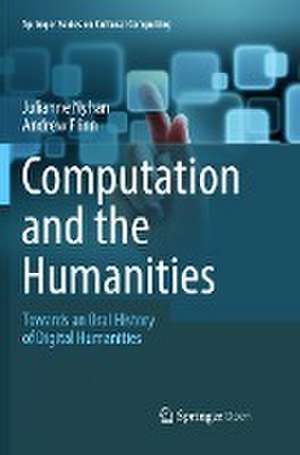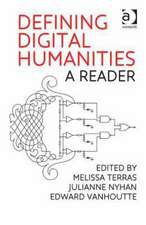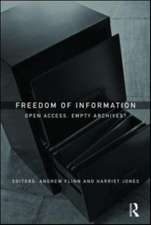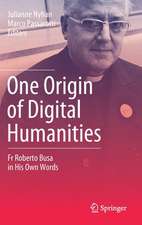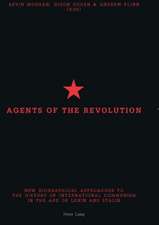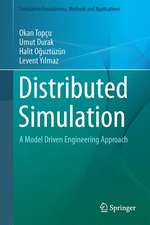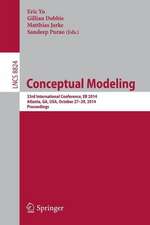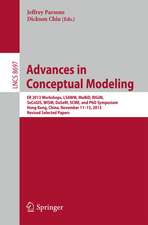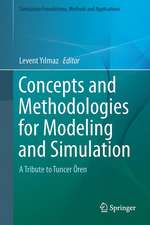Computation and the Humanities: Towards an Oral History of Digital Humanities: Springer Series on Cultural Computing
Autor Julianne Nyhan, Andrew Flinnen Limba Engleză Paperback – 6 iul 2018
By taking an oral history approach, this book explores questions like, among others, researchers’ earliest memories of encountering computers and the factors that subsequently prompted them to use the computer in Humanities research.
Computation and the Humanities will be an essential read for cultural and computing historians, digital humanists and those interested in developments like the digitisation of cultural heritage and artefacts.
This book is open access under a CC BY-NC 2.5 license
| Toate formatele și edițiile | Preț | Express |
|---|---|---|
| Paperback (1) | 361.03 lei 6-8 săpt. | |
| Springer International Publishing – 6 iul 2018 | 361.03 lei 6-8 săpt. | |
| Hardback (1) | 367.28 lei 6-8 săpt. | |
| Springer International Publishing – 30 noi 2016 | 367.28 lei 6-8 săpt. |
Din seria Springer Series on Cultural Computing
- 20%
 Preț: 648.26 lei
Preț: 648.26 lei - 20%
 Preț: 657.02 lei
Preț: 657.02 lei - 20%
 Preț: 167.45 lei
Preț: 167.45 lei - 20%
 Preț: 259.94 lei
Preț: 259.94 lei - 20%
 Preț: 332.89 lei
Preț: 332.89 lei - 20%
 Preț: 989.96 lei
Preț: 989.96 lei - 20%
 Preț: 660.48 lei
Preț: 660.48 lei - 20%
 Preț: 1308.39 lei
Preț: 1308.39 lei - 20%
 Preț: 936.37 lei
Preț: 936.37 lei - 20%
 Preț: 1164.84 lei
Preț: 1164.84 lei - 20%
 Preț: 334.20 lei
Preț: 334.20 lei - 20%
 Preț: 1165.69 lei
Preț: 1165.69 lei - 20%
 Preț: 937.44 lei
Preț: 937.44 lei - 20%
 Preț: 1046.24 lei
Preț: 1046.24 lei - 20%
 Preț: 1056.78 lei
Preț: 1056.78 lei - 20%
 Preț: 322.50 lei
Preț: 322.50 lei - 20%
 Preț: 934.84 lei
Preț: 934.84 lei - 20%
 Preț: 341.95 lei
Preț: 341.95 lei - 20%
 Preț: 1051.32 lei
Preț: 1051.32 lei - 20%
 Preț: 900.51 lei
Preț: 900.51 lei - 20%
 Preț: 1284.98 lei
Preț: 1284.98 lei - 20%
 Preț: 660.53 lei
Preț: 660.53 lei - 20%
 Preț: 897.81 lei
Preț: 897.81 lei - 20%
 Preț: 367.28 lei
Preț: 367.28 lei - 20%
 Preț: 1159.10 lei
Preț: 1159.10 lei - 20%
 Preț: 645.97 lei
Preț: 645.97 lei - 20%
 Preț: 338.16 lei
Preț: 338.16 lei - 20%
 Preț: 655.02 lei
Preț: 655.02 lei - 20%
 Preț: 648.95 lei
Preț: 648.95 lei - 20%
 Preț: 710.52 lei
Preț: 710.52 lei - 20%
 Preț: 1050.86 lei
Preț: 1050.86 lei - 20%
 Preț: 1164.05 lei
Preț: 1164.05 lei - 20%
 Preț: 1052.79 lei
Preț: 1052.79 lei - 20%
 Preț: 652.07 lei
Preț: 652.07 lei
Preț: 361.03 lei
Preț vechi: 451.29 lei
-20% Nou
Puncte Express: 542
Preț estimativ în valută:
69.09€ • 71.87$ • 57.04£
69.09€ • 71.87$ • 57.04£
Carte tipărită la comandă
Livrare economică 15-29 aprilie
Preluare comenzi: 021 569.72.76
Specificații
ISBN-13: 9783319792972
ISBN-10: 3319792970
Ilustrații: XI, 285 p.
Dimensiuni: 155 x 235 mm
Greutate: 0.42 kg
Ediția:Softcover reprint of the original 1st ed. 2016
Editura: Springer International Publishing
Colecția Springer
Seria Springer Series on Cultural Computing
Locul publicării:Cham, Switzerland
ISBN-10: 3319792970
Ilustrații: XI, 285 p.
Dimensiuni: 155 x 235 mm
Greutate: 0.42 kg
Ediția:Softcover reprint of the original 1st ed. 2016
Editura: Springer International Publishing
Colecția Springer
Seria Springer Series on Cultural Computing
Locul publicării:Cham, Switzerland
Cuprins
Once Neglected, Now Emerging and Absolutely Necessary: On the History of Digital Humanities or An Introduction.- Why Oral History?.- ‘Individuation is There in all the Different Strata:’ an Oral History Conversation between John Burrows, Hugh Craig and Willard McCarty.- ‘It was a Time When the University was Still Taking Account of the Meaning of universitas scientiarum’: an Oral History Conversation between Wilhelm Ott and Julianne Nyhan.- ‘hic Rhodus, hic salta’: An Oral History Interview Between Tito Orlandi and Julianne Nyhan.- ‘They Took a Chance’: An Oral History Conversation between Susan Hockey and Julianne Nyhan.- ‘And Here We go Back Again to the Influence of Algorithmic Thinking’: An Oral History conversation between Judy Malloy and Julianne Nyhan.- ‘I Would Think of Myself as Sitting Inside the Computer, Moving Things Around in Order to Accomplish the Goal of my Programming’: An Oral History Conversation Between Mary Dee Harris and Julianne Nyhan.- ‘I Was Absolutely Convinced That There Had to be a Better Way’: An Oral History Conversation Between John Nitti and Julianne Nyhan.- ‘It’s a Little Mind-Boggling Actually’: An Oral History Conversation between Helen Agüera and Julianne Nyhan.- ‘I Heard About the Arrival of the Computer’: An Oral History Conversation Between Hans Rutimann and Julianne Nyhan.- ‘Langezeit habe ich der Universitaet nachgetrauert’: An Oral History Conversation between Michael Sperberg-McQueen and Julianne Nyhan.-‘It’s Probably the Only Modestly Widely used System with a Command Language in Latin’: An Oral History Conversation Between Manfred Thaller and Julianne Nyhan.- ‘I was Keen on Getting Computers into Humanists’ Thinking’: An Oral History Conversation Between John Bradley and Julianne Nyhan.- ‘Moderate Expectations, Tolerable Disappointments’: An Oral History Conversation between Claus Huitfeldt and Julianne Nyhan.- ‘So, Into the Chopper it Went’: An Oral History Conversation between Gabriel Egan and Julianne Nyhan.- Revolutionaries and Underdogs.- By Way of a Conclusion.
Recenzii
“This is a well-worked collection of interviews that leads the reader through the development of the field of DH. … Computation and the humanities is a unique portrayal of the history of DH, and is recommended as an authoritative source--to be dipped into as your interests dictate, or to study more thoroughly to better understand how DH has developed. Those in computing who are interested in cross-disciplinary research around the humanities can use this volume … .” (Computing Reviews, September, 2017)
Textul de pe ultima copertă
This book addresses the application of computing to cultural heritage and the discipline of Digital Humanities that formed around it. Digital Humanities research is transforming how the Human record can be transmitted, shaped, understood, questioned and imagined and it has been ongoing for more than 70 years. However, we have no comprehensive histories of its research trajectory or its disciplinary development. The authors make a first contribution towards remedying this by uncovering, documenting, and analysing a number of the social, intellectual and creative processes that helped to shape this research from the 1950s until the present day.
By taking an oral history approach, this book explores questions like, among others, researchers’ earliest memories of encountering computers and the factors that subsequently prompted them to use the computer in Humanities research.
Computation and the Humanities will be an essential read for cultural and computing historians, digital humanists and those interested in developments like the digitisation of cultural heritage and artefacts.
This book is open access under a CC BY-NC 2.5 license
By taking an oral history approach, this book explores questions like, among others, researchers’ earliest memories of encountering computers and the factors that subsequently prompted them to use the computer in Humanities research.
Computation and the Humanities will be an essential read for cultural and computing historians, digital humanists and those interested in developments like the digitisation of cultural heritage and artefacts.
This book is open access under a CC BY-NC 2.5 license
Caracteristici
Presents a number of oral interviews and the key themes that emerge on the history of computing in Humanities and Cultural Heritage Provides an analysis of some of the social, intellectual and creative processes that have helped shape the research into computing in the humanities The book is accompanied by a website with additional and supplementary material such as archival photographs and sound recordings of oral history interviews
